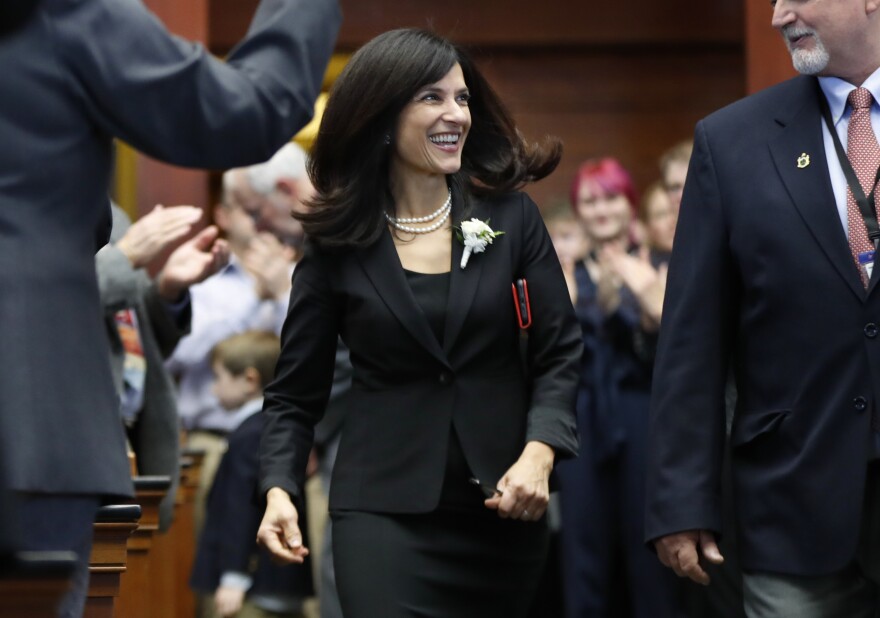Republican U.S. Sen. Susan Collins continues to build a formidable war chest for her likely 2020 reelection bid, even as she was outpaced last quarter by Democratic challenger Sara Gideon.
Collins, who has not officially launched her reelection campaign, hauled in more than $2.1 million during the period between July and September, bringing her total amount raised to more than $8.6 million. Gideon pulled in more than $3.2 million during the same reporting period, far more than the three other Democratic challengers vying to take on Collins, should she run.
The prolific fundraising by the two candidates — and how they’re spending their campaign cash — further illustrates the stakes in a race already drawing spending by outside groups and one that could help determine which party controls the U.S. Senate in 2021. Collins has cruised in each of her three previous reelection bids, but she is considered more vulnerable now because of a deeply polarizing President Donald Trump and votes she’s taken since he took office in 2017.
Gideon’s fundraising blitz arguably reflects the challenge Collins faces. She pulled in more than $1 million shortly after joining the race in June, and her campaign continues to tap the small-dollar wellspring that has become common among Democratic candidates eager to claim grassroots support even while pulling donations from across the country.

Gideon has more than $2.7 million in available cash. So far her campaign has spent most of its money attempting to raise more, including over $741,000 to the Washington D.C. firm Aisle 518 to acquire fundraising lists and digital outreach to donors.
Collins, meanwhile, sits on more than $7 million in available cash. Her campaign spent more than $400,000 last quarter on various initiatives, including some designed to bolster or reaffirm her support in Maine. Among them: banquet sponsorships for the Maine Heritage Policy Center and the Sportsman’s Alliance of Maine. She has also paid for constituent outreach via Main Street Solutions, an Augusta lobbying firm.
Collins’ campaign also spent money on three polls, including two in September that coincided with revelations that the president sought an investigation into his political rival, former Vice President Joe Biden, by the Ukranian government. The resulting impeachment inquiry by the U.S. House of Representatives could eventually force Collins to vote on whether the president should be removed from office, adding to the political jeopardy she already faces.
Previous polls show that Collins had become less popular following her vote to confirm U.S. Supreme Court Judge Brett Kavanaugh last year. The vote angered a key segment of Collins’s base of support, but won her favor with some conservative donors, including members of The Federalist Society, the group claiming credit for the increasingly rightward tilt of the federal judiciary and for vetting Trump’s picks for the high court. Included in Collins’ quarterly report are donations from Federalist Society’s members, some of whom held a fundraiser for her in Mount Desert Island over the summer.
The Kavanaugh vote also spurred crowdfunding efforts that total more than $4 million, an amount that will go to the Democrat candidate who wins next year’s primary.
Gideon has received early endorsements from the Democratic Senatorial Campaign Committee — the lead committee working to elect Democratic candidates in 2020 — as well as backing from the pro-choice group NARAL and EMILY’s List, the preeminent national group backing Democratic women candidates.
The early backing of Gideon has made it difficult for Democratic candidate Betsy Sweet to compete in the money contest, although she has attended numerous events designed to garner grassroots support. Sweet, an Augusta lobbyist who finished third in last year’s gubernatorial primary, reported more than $102,000 during the last quarter and has more than $87,000 in available cash.
Jonathan Traecy, who recently entered the Democratic primary, reported more than $33,000 in donations and $26,000 in available cash. Bre Kidman, an attorney from Saco, reported more than $2,900 in donations. More than $1,700 was reported as in-kind donations from Kidman and roughly $1,200 from individuals.




